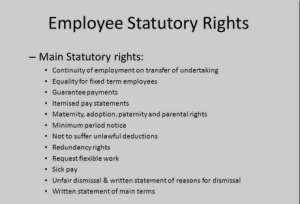Employment law governs the relationship between employers and employees, outlining the rights and responsibilities of both parties. Legal rights of employees are crucial for ensuring fair and just workplace practices. Here are key aspects of employment law and the legal rights of employees:

Employment Law And The Legal Rights Of Employees
Table of Contents
Toggle1. Employment Contracts:
- Offer Letters and Employment Agreements: The terms and conditions of employment, including job responsibilities, compensation, and benefits, are typically outlined in written agreements.
2. Discrimination and Equal Opportunity:
- Anti-Discrimination Laws: Employees have the right to be free from discrimination based on factors such as race, gender, age, disability, religion, or national origin.
- Equal Employment Opportunity (EEO): Laws promoting equal opportunity in hiring, promotion, and compensation.
3. Harassment and Hostile Work Environment:
- Sexual Harassment: Employees have the right to work in an environment free from sexual harassment.
- Hostile Work Environment: Protection against a hostile or abusive work environment based on protected characteristics.
4. Wages and Hours:
- Minimum Wage Laws: Employees are entitled to receive at least the minimum wage set by federal or state laws.
- Overtime Pay: Eligible employees are entitled to overtime pay for hours worked beyond a certain threshold in a workweek.
5. Family and Medical Leave:
- Family and Medical Leave Act (FMLA): Eligible employees have the right to take unpaid leave for family or medical reasons without the risk of losing their job.
6. Workplace Safety:
- Occupational Safety and Health Administration (OSHA): Employees have the right to a safe workplace, and employers are obligated to comply with safety regulations.
7. Privacy Rights:
- Employee Privacy: Protection of employees’ privacy rights in areas such as electronic communications, monitoring, and personnel records.
8. Whistleblower Protection:
- Reporting Unlawful Activities: Employees have the right to report illegal activities in the workplace without fear of retaliation.
9. Retirement and Pension Plans:
- Employee Retirement Income Security Act (ERISA): Protection of employees’ rights regarding employer-sponsored retirement and pension plans.
10. Unemployment Benefits:
- Right to Unemployment Benefits: Eligible employees have the right to apply for and receive unemployment benefits when unemployed through no fault of their own.
11. Workers’ Compensation:
- Injury Compensation: Employees have the right to receive compensation for work-related injuries or illnesses through workers’ compensation programs.
12. Collective Bargaining and Union Rights:
- National Labor Relations Act (NLRA): Protection of employees’ rights to engage in collective bargaining, form or join unions, and participate in concerted activities.
13. Employee Handbook and Policies:
- Policy Compliance: Employees have the right to know and understand workplace policies outlined in employee handbooks.
14. Reasonable Accommodations:
- Americans with Disabilities Act (ADA): Employers are required to make reasonable accommodations for employees with disabilities to perform their job duties.
15. Termination and Severance:
- Termination Rights: Employees generally have the right to know the reason for termination and, in some cases, the right to severance pay.
Conclusion:
Understanding and upholding the legal rights of employees is essential for creating a fair and equitable work environment. Employers must stay informed about employment laws, and employees should be aware of their rights to ensure a mutually respectful and lawful workplace. Legal disputes related to employment can be complex, and seeking legal advice from employment attorneys can help resolve issues and ensure compliance with applicable laws and regulations.
